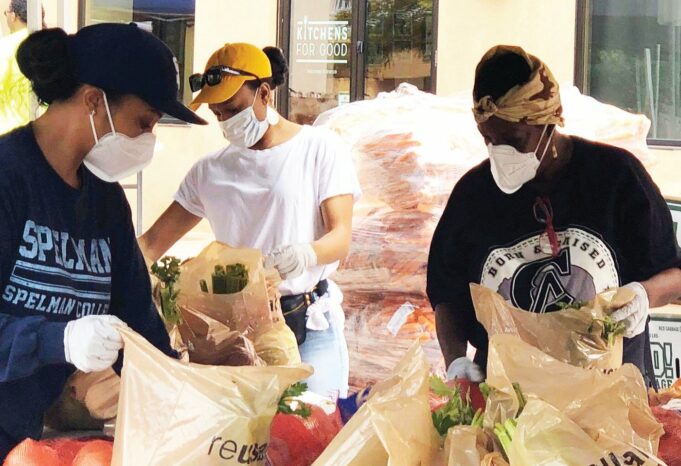Across the country a collective effort is being made to assist families who have suffered due to the Covid-19 pandemic. Black families, in particular, are on the shortest end of the stick given the higher rates of unemployment and less access to health services in their communities.
In response to this, Muslims, often partnering with organizations, have doubled-down on going out into the streets and contacting people door-to-door, while others have expanded their work in food pantries and are offering other relief services.
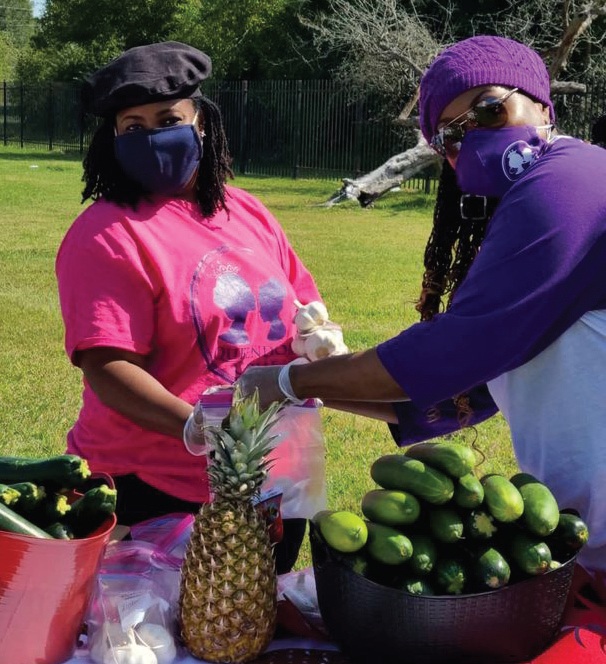
In San Diego, Student Minister Abdul Waliullah Muhammad from Muhammad Mosque No. 8 helps facilitate food giveaways and assisting families through the I Am My Brother’s Keeper (IAMBK) organization.
“When I first started the organization in 2002 it was based on self-improvement, the basis of community development,” Student Min. Waliullah Muhammad told The Final Call. “We’ve had this nonprofit since 2002. During Covid we switched from our tutoring, our mentoring, our literacy program and went into health perspective to advocate for testing sites to food distribution programs over the last 8 months since April.”
San Diego faced a 15 percent unemployment rate and a 50 percent increase in food-insecure families since the Covid pandemic. Student Min. Waliullah Muhammad with IAMBK is helping address the problem by servicing approximately 1,200 families a week and continues to advocate testing and safety measures in light of the pandemic.
“We service the Black, the Brown and the Red community as we go, and everybody can come. Based on what the Honorable Elijah Muhammad said, we want justice applied equal to all regardless of their class, creed or color,” he said referring to the Nation of Islam patriarch.
Debra Williams who frequents the food pantry said it is a blessing to have help within her own community. “I just think it’s a blessing because I’m raising 5 grandkids and I’m unemployed and on social security and it’s just a blessing; you come up and they don’t ask any questions, they just give you the food!”
Mrs. Williams said she will be telling others about it and hope IAMBK continues in their efforts.
“You couldn’t ask for more in the community,” she continued.
“I think it’s a blessing,” said 33-year-old Haidee Courtes, “I was working at a metal company since I was 13 and when the pandemic first hit, I got let go. I never thought in a million years I would be let go and I just went through my savings, and I was embarrassed but I went to the pantry and I heard about it through Facebook and I went to the IAMBK, and I just started volunteering and one day they offered me a job!” she said.
“So, I feel coming from a personal perspective I think the food pantry’s a blessing especially—I have been told because I’m a Spanish-speaker—by the Spanish-speaking community how they love coming to our food pantry because we don’t ask for any information, it’s safe. … They have told me that they only come to our food pantry.”
Livingston Jerome wrote on Facebook about IAMBK, “Had this program been around during my time, I might’ve turned out differently, stayed in school, not become involved in drugs, and teenage parenting. With simple guidance, I would have been a better person and a productive citizen in the community. Through my books, I try to help and motivate people.”
Across the coast Eugene Khaan, founder of Muhammad’s Food Pantry in Chicago is continuing the effort in assisting families in need. “I think what we’re looking to accomplish is to share the message of doing for self and communities being self-reliant. We take extensive measures, we go out of our way to try to show that we care and to offer nutrition, education and to provide nutrition and food resources to our seniors and our children.”
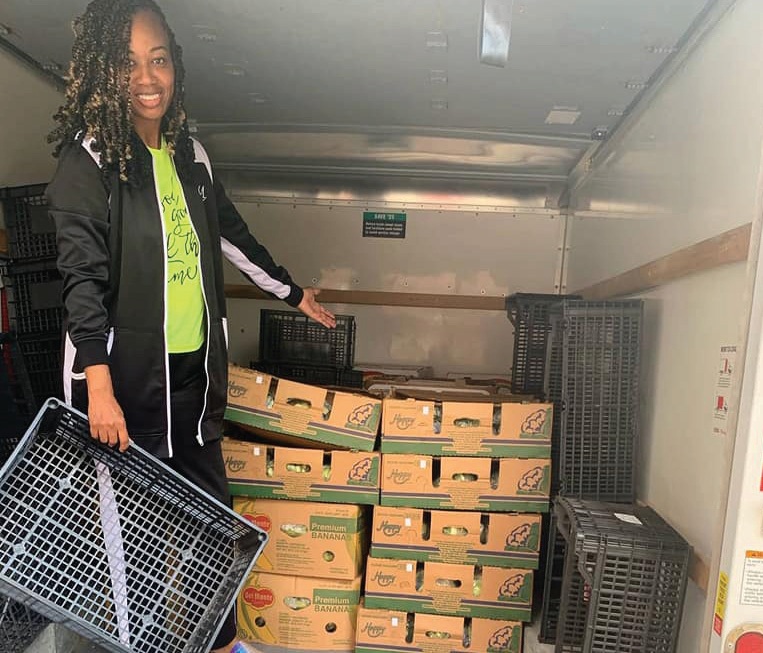
Muhammad’s Food Pantry was established in 2004 and is partnered with the Greater Chicago Food Depository to provide free food and delivery for families in need.
“We service approximately 120 households a month, reaching 500 individuals with meals,” Mr. Khaan continued. “People are waking up and being more aware of initiatives like urban gardening and learning how to eat to live that they want to come to Muhammad’s Food Pantry where they can get good, clean, healthy items to feed their family,” he explained. The program is based at Mosque Maryam, the National Center and the headquarters of the Nation of Islam, which is its distribution site.
“The FOI has recently stepped up huge and that’s enabled this expansion, and it’s Brother Lyle Muhammad, Brother Jay Muhammad and Brother James X Floyd, those three soldiers have stepped up big time and have donated their time, money and transportation and that’s been the catalyst for this growth.” The FOI (Fruit of Islam) are the male members of the Nation of Islam.

Mr. Khaan also provides furniture donations as a partner with the Chicago Furniture Bank and facilities coat giveaways every year in February. For 2021 he wants to provide 2,000 brand new, high-quality coats for families as part of his annual February coat giveaway.
Shahid Muhammad, also from Chicago, responded to the need to assist families by going door-to-door with food, masks and health supplies and bringing help directly to people.
“We would go into the community, set up a table, get a bullhorn and bring them over to the table and they would get a mask, dinner and the book ‘How to Keep House,’ ” the Nation of Islam student minister told The Final Call.
Naeemah Muhammad, Student National MGT & GCC Captain of the Nation of Islam along with the MGT (Muslim women of the Nation of Islam) across the country have sewn thousands of masks to give to communities as well as copies of the book “How To Keep House: Maintaining A Clean and Safe Environment.”
“The quarantine hit Chicago and then we were asked as FOI to come in the streets being that that’s something I do religiously and want to feverishly,” Shahid Muhammad continued. “We were on the West Side a couple of weeks ago and they were just like, ‘Oh, this is beautiful! We didn’t know the Muslims did this, and I’m like, ‘yeah, we do this.’ They were just thanking us, so grateful saying this is right on time.”
According to the Illinois Department of Health, Blacks make up one of the higher percentages of positive Covid cases with 57,057 total. Blacks are 60 percent of Covid deaths in Chicago, according to one study. At the same time, Blacks make up the highest unemployment rate at 6.7 percent reports the Economic Policy Institute. This means Blacks are least likely to be able to afford the healthcare services needed, especially during the pandemic.
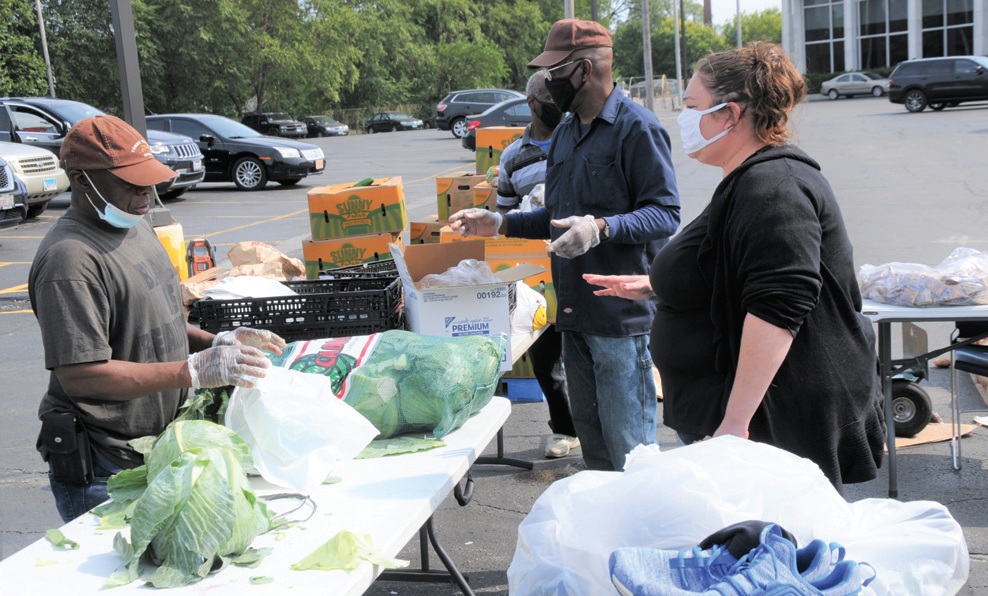
“We want to serve as an inspiration to the Nation (of Islam), particularly the brothers across the Nation that if you’re not out doing the resurrection work, it’s time to get out because our people are dying, suffering and our Minister (the Honorable Minister Louis Farrakhan) needs help and we’re supposed to be helpers in his cause, and his cause is the resurrection so if we’re not doing resurrection work, we’re not helping him,” said Shahid Muhammad. “We’ll keep doing it until Allah (God) calls us in.”
Not far from Chicago, in Detroit Student Minister Troy Muhammad and Muslims from Mosque No. 1 serviced over 7,000 families since the pandemic.
“We were asking for nothing in return, and just making sure the people were straight,” Student Min. Troy Muhammad told the Final Call. “They had what they needed through this time period so we also distributed PPE and made it available for people to pick it up. We did that on our own and also did it with different community groups that we partner with to do that and we still do that on a consistent basis.”
With the help of Ethika clothing company, the FOI from Detroit were able to distribute 20,000 masks to the community in addition to masks sewn by the MGT.
“The neighborhood is very thankful, very appreciative,” Troy Muhammad continued. “Our FOI, over the past couple of weeks we’ve been also distributing hot meals, bean soup, along with the masks the MGT provided.”
He also said for the upcoming months, the plan is to provide clothing drives for women and children affected by the Covid pandemic. “Service is the rent that you pay in God’s universe and we have an example of service in the Honorable Minister Louis Farrakhan,” Min. Troy Muhammad continued.
Student Minister Abdul Sharrieff from Atlanta with the 10,000 Fearless is following the same guidance. After Minister Farrakhan called for 10,000 Fearless men and women during his October 10, 2015 address, the 10,000 Fearless movement has been providing to families in need. Their efforts have doubled since the pandemic.
“I’m talking about they come all day long, and the brother who’s there he feeds them bean soup and fixes sandwiches for them. I’m talking about families come with their children and they’re so appreciative when they get the food, and we really need to have like the Hon. Minister Louis Farrakhan told us to open the 10,000 Fearless all over the country.”
With the 10k Fearless in Atlanta serving at least 200 families a week, and the 10k Fearless spreading across the south and other parts of the country 500,000 pounds of food a week are distributed to families a week.
“Since the pandemic, it has increased because some of the places in the city had closed down, and they found out we were still servicing the people so they’re coming over to us, and we had a winter coat drive last week, and we’re getting ready to have another one in the next two weeks,” the Atlanta-based regional student minister continued.
“We all should be found doing what the Honorable Minister Louis Farrakhan asked us to do which is shelter in place but when we service the community, put on our gloves, put on our face masks and serve our people. … Do not allow our people to go hungry when we have the knowledge.”
Sadiyah Karriem of Queendom Come, a nonprofit female empowerment and mentoring organization in Houston, Texas is on the same mission. The organization formed in 2015 after a nationwide “Save Our Girls” event organized by the National MGT Office and which featured a keynote address by Min. Farrakhan.
“It was such a beautiful event that we wanted to continue to work in the community,” Ms. Karriem, an attorney, told The Final Call. In response to growing food insecurity and shortages in the city, Queendom Come facilitates two food pantries, the Sisters’ Kitchen and People’s Pantry.
“We created the People’s Pantry and Sisters’ Kitchen and so, with the Sisters’ Kitchen we—and the People’s Pantry—created an open market-type of food drive where we pick different communities that have been ravaged with Covid and where there’s a food desert, and in that we receive donations from many people, sponsorships (from) organizations, and we take that money and purchase quality food and we have an open market,” she continued.
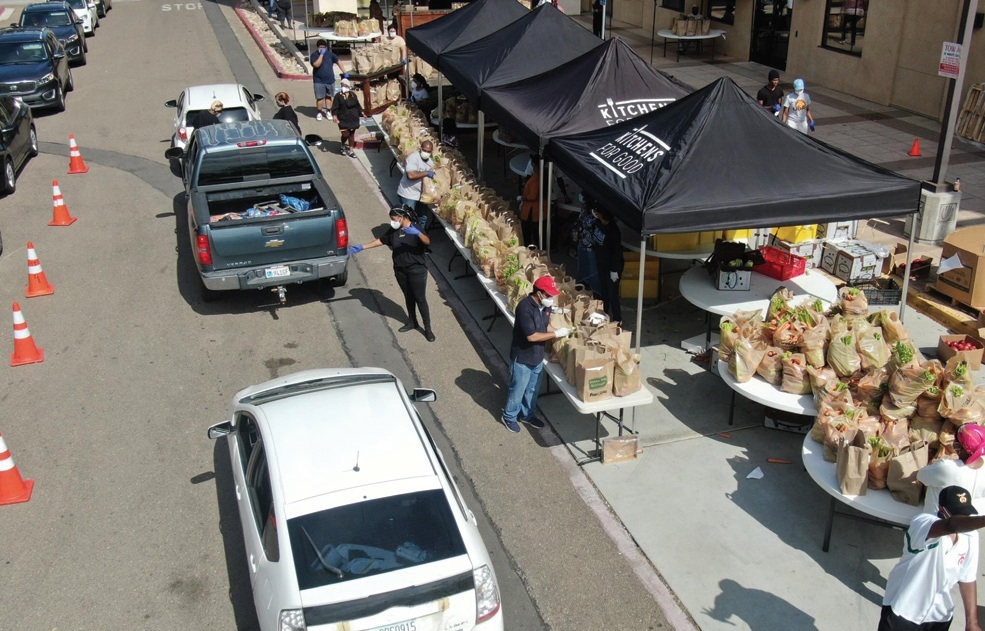
We go into the communities, serve families and we have an onsite chef who shows them how to cook simple, nutritious meals, she added.
The Houston Health Department reported that 190 Covid-19 fatalities have been confirmed within the Black population and Blacks account for 23 percent of the total Houston population.
Ms. Karriem said, since the pandemic approximately 600 families have been served, and that people from the community have responded well to the organization’s efforts.
“We’ve been going into these communities and they’ve been getting to know us, and so now they sit and they listen and they talk with us, and they ask how do you become a member of the Nation,” she continued. “We have had a lot of sisters who want to duplicate what we’re doing and so we’re working on that right now.”
Ms. Karriem said the next step is to expand Queendom Come outside of Houston and inspire more women and girls throughout communities in the same direction.
Muslims in other cities, like Baltimore, Los Angeles, Flint, Mich., Washington, D.C., Philadelphia, and mosques north, south, east and west are offering safe service in a time of trouble.












